MercoPress. South Atlantic News Agency
Tag: Daniel Ortega
-
Friday, May 25th 2018 - 09:00 UTC
Nicaragua peace talks collapse and clashes resume : two dead and 50 injured
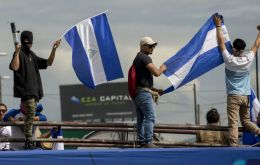
At least two people were killed and 50 wounded as clashes flared in Nicaragua after peace talks between the government and opposition collapsed, the Red Cross and victims' relatives said on Thursday.
-
Monday, May 21st 2018 - 08:42 UTC
Nicaraguan truce on the cliff after claims police attacked and shot students
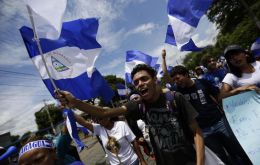
Nicaraguans were back on the streets in their thousands on Sunday to protest what they called a government breach of a two-day truce agreed during Church-mediated peace talks. Students at a university in northeastern Managua claim police attacked them during a demonstration outside the campus on Saturday night in which four students were shot and injured.
-
Thursday, May 17th 2018 - 08:59 UTC
Angry Nicaraguan students call Ortega “murderer” and demand his resignation
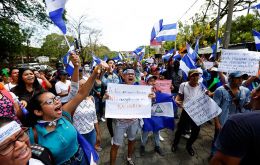
Angry Nicaraguan students taunted President Daniel Ortega with shouts of “murderer” as he spoke on Wednesday at a Catholic church-organized event aimed at negotiating a solution to weeks of deadly protests that have challenged his rule.
-
Monday, May 14th 2018 - 08:34 UTC
Nicarguan army sides with protests, calls for an end to violence
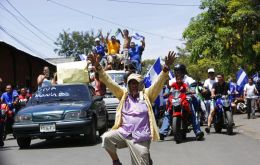
Nicaragua's military called for a halt to violence that has rocked the country during weeks of protests and a deadly crackdown by police and supporters of President Daniel Ortega's government. In a statement late Saturday, the army also expressed solidarity with families of those who have died — more than 60, according to a human rights group.
-
Monday, April 30th 2018 - 09:00 UTC
Massive peaceful turnout in Nicaragua, with a month mediation of the Church
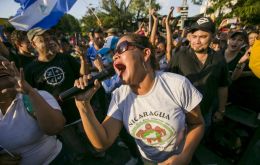
Thousands of Nicaraguans marched peacefully through the capital Managua on Saturday in a mass demonstration to demand justice following the violent suppression of a wave of protests that left at least 43 people dead. During the rally, which was called by the Catholic church, Managua's bishop issued a deadline of one month to see if there was a serious intention to achieve change through a national dialogue aimed at resolving issues that triggered the country's worst unrest in 11 years.
-
Friday, April 27th 2018 - 13:34 UTC
The Washington Post: The political rot in Nicaragua
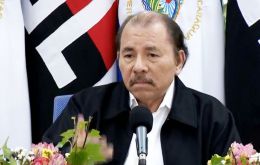
Nicaragua is a volcanic nation, geologically and politically. Forty years ago, seemingly out of nowhere, a series of popular eruptions shook the entrenched regime of Anastasio Somoza, who fell from power on 19 July, 1979. Today, one of the revolutionary architects of that dictator’s ouster, Sandinista party chief Daniel Ortega, rules the country of 6.1 million as high-handedly and corruptly as Somoza ever did.
-
Wednesday, April 25th 2018 - 15:17 UTC
Repression and protests in Nicaragua do not mitigate: Daniel Ortega as Nicolás Maduro?
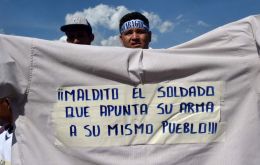
“Ortega and Somoza are the same thing” protesters in Nicaragua yelled last week against the government of Daniel Ortega, after the announcement of a Social Security's reform that unleashed a wave of protests marked by repression and excessive use of force by the authorities. Human rights organizations have announced that at least 30 people have died in the demonstrations, including students, police and a journalist. This surprise wave of civil protests suggests comparing the crisis in the Central American country with the lived in the Venezuela of Hugo Chávez and Nicolás Maduro for years.
-
Monday, April 23rd 2018 - 09:49 UTC
Nicaragua's Ortega cancels social security reform following riots and death of 26 killed by police
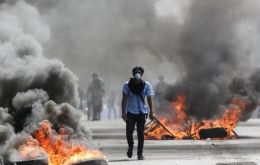
Nicaragua's president on Sunday withdrew changes to the social security system that had triggered several days of deadly protests and looting. President Daniel Ortega said in a message to the nation late Sunday that the National Social Security Institute's board of directors had canceled the changes that were implemented April 16.
-
Monday, November 7th 2016 - 08:11 UTC
Nicaragua ballots confirming a husband-wife presidential couple
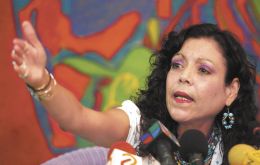
Nicaragua held elections Sunday that look certain to hand another term to popular President Daniel Ortega, and make his wife Rosario Murillo vice-president, but which the opposition said was marked by “massive” voter abstention and the US Department has described as “rigged”.
-
Friday, December 26th 2014 - 07:30 UTC
Nicaragua: civic organisations want protesters freed, 'Chinese invaders' out

Expropriation law upsets peasants, environmentalists. 30 arrested nationwide. President Daniel Ortega dubbed a 'traitor'.
